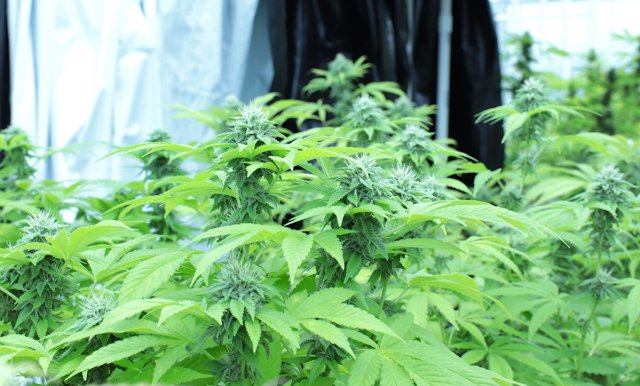
(Update: On Thursday, Dec. 26, 2019, multiple media noticed and reported that the recreational marijuana initiative petition discussed below had a status change on the Oklahoma secretary of state website. The site stated that proponents of the petition had filed an official notice of withdrawal on Dec. 23.)
(Second Update: On Friday, Dec. 27, 2019, a new version of a recreational marijuana initiative petition was filed as SQ 807 with the secretary of state’s office. The petitioners for SQ 807 are listed as Michelle Tilley and Ryan Kiesel. Kiesel is the executive director for the Oklahoma chapter of the American Civil Liberties Union.)
A proposal that would amend the Oklahoma Constitution to legalize marijuana for recreational use was filed Thursday, nearly 18 months after state voters legalized medical marijuana.
The recreational marijuana initiative petition, filed as State Question 806 with Secretary of State Michael Rogers’ office, would need about 178,000 valid voter signatures to make a 2020 ballot. Supporters would have 90 days to gather signatures once all potential challenges to the petition language are addressed.
The proposal for SQ 806 was filed by two residents of Oklahoma City: Amy Young and Vanessa Brandon Avery.
“We have seen all across Oklahoma, from our cities to our rural areas, the widespread support among our voters to regulate and tax adult marijuana use,” Young said in a statement to NonDoc. “The status quo wastes law enforcement resources that would better be spent fighting serious crimes. Eleven other states have successfully legalized adult use of marijuana, generating over $1 billion in new tax revenue to fund vital services in those states.”
Young said she is not currently involved in any medical marijuana businesses.
“We are exploring the initiative petition process right now to determine the feasibility of letting Oklahomans vote and decide this important issue as early as next year,” Young said. “Allowing adult-use of marijuana, and regulating and taxing it, is a good policy decision for the state of Oklahoma, and voters should now have the opportunity to decide this issue at the ballot box.”
In June 2018, Oklahoma voters passed one of the broadest medical marijuana laws in the country by approving SQ 788 with 56.9 percent support. Battles over the implementation of that law ensued with the State Board of Health and during the 2019 session of the Oklahoma Legislature.
Young is the co-founder and executive director of SixTwelve, a sustainable community space that supporters several projects in OKC’s Paseo Arts District.
Blake Johnson, an attorney with Overman Legal Group, represents current medical marijuana businesses, some of which are connected to the SQ 806 effort.
“I think the industry broadly welcomes this very long overdue reform. We’re proud of what Oklahoma has already accomplished with SQ 788’s progressive approach to medical cannabis and see this as the natural step forward,” Johnson said in a statement. “Medical cannabis is already generating many millions of dollars in tax revenue for the state, and expanding that tax base will generate many millions more. We all know that criminal prohibition is a failed project. It’s time we start responsibly regulating cannabis to ensure public health and devote the resources it generates to the benefit of the state.”
A July 2019 SoonerPoll survey asked respondents whether they supported the legalization of marijuana for recreational use. A combined 59.2 percent said they opposed the idea, while 36.1 percent of respondents favored it.
Details of the recreational marijuana initiative petition
If passed, SQ 806 would legalize possession and consumption of marijuana in Oklahoma by people 21 years of age or older, with restrictions in place for those in motor vehicles, those on school or other property and those performing tasks that “would constituent negligence or professional malpractice” if intoxicated from marijuana. The proposal (embedded below) would specify smoking marijuana in a public or otherwise prohibited place as being subject to a $25 fine and not as justification for detention by police.
SQ 806 would rename the Oklahoma Medical Marijuana Authority as the Oklahoma Marijuana Authority and set forth requirements for licensing, including that no licensee selling marijuana could do so within 1,000 feet of a school. The proposal would allow a local government to “enact ordinances or other regulations governing the time, place and manner of licensees operating within its jurisdiction.”
Under SQ 806’s proposed constitutional language, Marijuana would be subject to a 15 percent excise tax upon the gross receipts of all marijuana sold. The language states that the Oklahoma Legislature could adjust that tax rate after Nov. 3, 2024, “to achieve the goals of undercutting illicit market prices and discouraging use by persons younger than 21 years of age.”
The proposed language would create the Oklahoma Marijuana Revenue Trust Fund and would direct collected monies to be allocated three ways:
- 4 percent back to municipalities or the counties of unincorporated areas where retail sales occurred;
- 48 percent “to grants to public schools to develop and support programs designed to prevent and reduce substance abuse and improve student retention and performance”;
- 48 percent “to provide grants to agencies and not-for-profit organizations, whether government or community based, to increase access to evidence-based low-barrier drug addiction treatment.”
Other proposed constitutional changes
The recreational marijuana initiative petition is the fourth proposed change to the Oklahoma Constitution this year. Supporters of a proposal to expand Medicaid — SQ 802 — have already submitted more than enough signatures to place their petition on a 2020 ballot.
SQ 804 proposes an independent redistricting commission, and SQ 805 proposes prohibiting the consideration of past non-violent felony convictions from being used to enhance the sentencing severity of subsequent non-violent convictions.
In August 2018, a recreational marijuana initiative petition failed to submit the required number of votes after drama relating to petition totals erupted among grassroots organizers.
Read the full recreational marijuana initiative petition
 Loading...
Loading...
(Correction: This story was updated at 9:45 a.m. Monday, Dec. 16, to correct the number a referenced state question.)





















